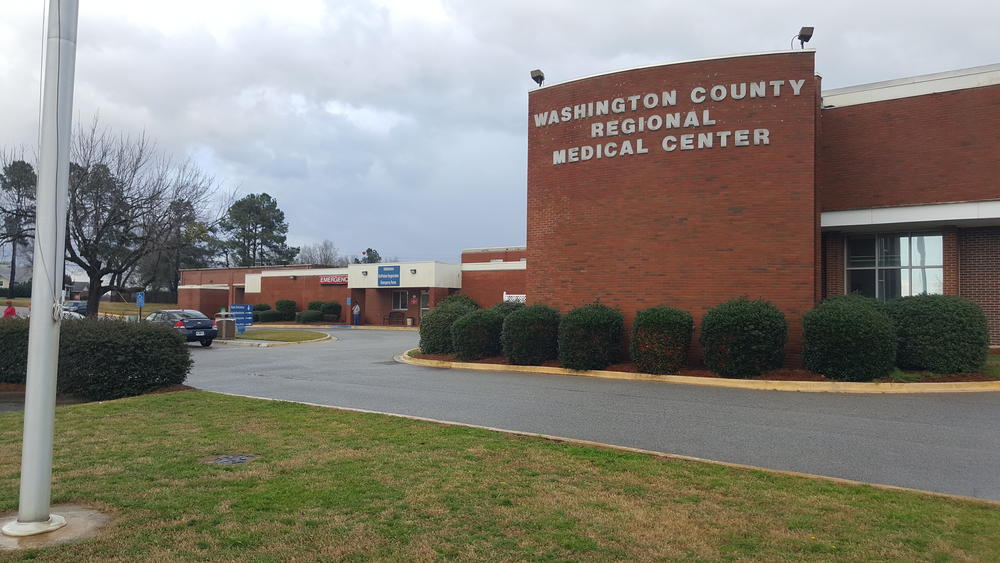Section Branding
Header Content
A Rural Hospital Needs Tax Dollars to Ward Off Closing
Primary Content
Hear how Washington County Regional will try to convince property tax voters to help its finances.
The hospital in Sandersville - Washington County Regional Medical Center - serves thousands of people in east central Georgia.
But, like so many hospitals in rural Georgia, it runs in the red. That's because of a combination of poor management decisions and struggles common to health care facilities in less populated areas.
The authority that oversees Washington County Regional has an idea to get back on sound financial footing: Borrow more than $15 million backed by property taxpayers. That would happen in the form of a public referendum on May 24.
Patrick Hulsey waited for an X-Ray of his knee in the Sandersville Hospital. Would he support raising property taxes to keep the hospital open. At first, Hulsey was skeptical.
"That's a large amount of money,” he said.
But then Hulsey said he knows how everyone in Washington and surrounding counties depend on the hospital.
“You ain’t got a hospital in Sandersville, you got to go all the way to Dublin for a hospital,” he said.
What put Washington County Regional in such a position? Hospital Authority Chairman Jim Croome said the management had lost its way over the past four years, and he must explain this.
“First thing we point out is we have probably $8 million in debt that doesn't go away,” Croome said. “We still have to deal with $8 million in debt.”
Bad management decisions to take on debt during the economic downturn is part of the problem. Another part is that people from Washington County Regional’s target service area are going to other hospitals for help.
Fewer people, Croome said, are coming to the hospital’s emergency room, what he called the front door of the hospital.
“If your emergency department is not working well, if your numbers are down, there is going to (be) a huge effect on the admissions in the hospital itself,” Croome said.
Croome turned quickly to the economic impact of the hospital, should it close. About 300 people work at the facility.
Charles Lee, director of economic development for Washington County and Sandersville, said that losing the facility would mean a tough road to attract new businesses.
“If we do not maintain our hospital and the health care services that are attendant to that, then I may as well close my door to economic development,” Lee said. “People will not desire to come here.”
Since 2010, five hospitals in rural Georgia have closed. Why? Rural hospitals strain to adjust to health care changes, like those that came with the Affordable Care Act.
Charles Owens, a professor of Health Policy at Georgia Southern University and a rural health care, said that rural facilities also have to deal with an unhealthy population.
“We're certainly known for our poor health outcomes are poor lifestyle choices,” said Owens, who is also a member of the Georgia Rural Health Association. “We have higher incidence of smoking and obesity and it creates an environment where we have a population that's higher in diabetes higher in hypertension cardiovascular disease and providing care to those patients that are challenging.”
State government has tried to address rural health care’s plight. Governor Nathan Deal set up a task force. Lawmakers have proposed tax breaks for rural health institutions. And some have argued to expand Medicaid reimbursement by using the troubles of rural health care.
But Washington County Regional’s authority has taken matters in its own hands. The authority works more closely with the county government and may contract with Augusta University for management help.
The key, though is the $15 million dollar bond backed by property taxes.
Washington County Attorney Tom Rawlings knows the community has already approved special taxes for new schools and a new jail.
“I think a number of people say well we've already done these things and now we're adding to that you know more more tax more tax;” Rawlings said. “But I think when people realize that it's not a question of a want it's a question of a real necessity for this county to have health care here because the option is simply unthinkable.”
Public support, however, must go beyond taxes. When people in Washington and surrounding counties need health care, more of them will need to return to the Sandersville hospital.
“It is absolutely ‘buy local,’” said Charles Owens. “When when you put up signs and you say ‘shop local’. It means your health care as well.”
Support for Health, Education, and Poverty reporting on GPB Macon comes from the Peyton Anderson Foundation.


